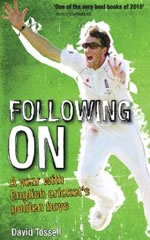Following On
Martin Chandler |Published: 2010
Pages: 240
Author: Tossell, David
Publisher: Know The Score/Pitch Publishing
Rating: 4.5 stars

In February 1998 England’s Under-19s won the World Cup in South Africa by comfortably beating New Zealand in the final. In this book David Tossell has looked at the lives and subsequent careers of the 14 members of the England squad (a 15th man, Middlesex all rounder Aaron Laraman, had left the party early due to injury). In the course of the 2009 season Tossell spoke to each of the 14, as well as a number of others who were involved in their cricketing development. The result is a highly unusual cricket book which certainly justifies the prediction I made last December, which stares out at me from the book’s jacket, that it would be “one of the very best books of 2010”.
Inevitably the stories vary enormously. One of the squad, Graeme Swann, has become an established international cricketer who, as much as a man can ever be, is an automatic selection for England in all formats. Swann’s has been the traditional long apprenticeship of the spin bowler, it being a decade on from the World Cup before he gained his first Test cap. Tossell skilfully contrasts his career with that of leg spinner Chris Schofield, in those days a Lancashire player, who was fast tracked to a central contract and a Test debut just two years after the World Cup win. The story of Schofield’s later journey into the cricketing wilderness and back is one of the highlights of the book.
As the class of ’98 have hit their thirties there are five others left in the First Class game. Kent skipper Rob Key, second to win a Test cap in 2002, is one. In 2009 there was a chance that weight of runs might propel Key back into the Test side for the Ashes but the call never came, and it seems now as if a career that promised much might well now be restricted to just 15 Test matches, the last of which was in South Africa in 2005. Another man who remains in the game is the enigmatic Owais Shah, captain of the World Cup winners and, at that time, by some distance the most accomplished player in the team. Like so many others have done Tossell tries hard to pinpoint why such a prodigious talent should have been restricted to just six Tests. While the complete answer to that question will always remain elusive, this is the most convincing assessment I have read.
England’s matchwinner in the final was opening batsman Stephen Peters who scored a century and was not dismissed until the winning post was in sight. Peters has played for three counties but, a disastrous 2005 apart, has scored runs consistently since he became established. Had he not suffered injuries at key moments he might just have gone on to earn an opportunity at a higher level. Two others did earn their chances. Nottinghamshire’s Paul Franks has enjoyed a decent career at county level with both bat and ball but the expectations raised by his ODI debut against the West Indies in 2000, just a few weeks after Schofield’s Test debut, were never fulfilled. That single match has remained the sum total of Franks’ international career. In 2008 a remarkable display of hitting in a televised T20 game, where he struck 16 sixes in one innings, saw Graham Napier, elevated to the England T20 squad for the 2009 World Cup. Sadly for Napier he did not actually take the field for England, and following his omission from the 2010 squad it seems unlikely that further recognition will follow.
Of the other seven members of the squad none remain in the First Class game. Richard Logan, a great friend of Kevin Pietersen, who had five spells at four different counties without ever being sure of a place, was the most persistent but he left county cricket after an unproductive 2009 at Surrey.
Wicketkeeper Nick Wilton left Sussex after 2002. Essex off spinner Jonathan Powell made his County Championship debut at 18 but the one wicket he took then was the only one in a First Class career which ended after just two more matches. Making up the winning XI in the final was Giles Haywood of Sussex. Haywood’s bowling that day was outstanding, ten overs of his niggardly right arm medium pace costing just 18 runs as well as accounting for three top order batsmen. Sadly despite such a promising start Haywood’s First Class career consisted of just one wicketless match for his county in 1999.
The remaining three men did not make the final XI but had played earlier in the competition. They were two batsmen, Ian Flanagan and Michael Gough, and a pace bowler, Jamie Grove. Flanagan played 18 times for Essex between 1997 and 2000 without passing 61. Gough, from Durham, was a sound opening batsman who played with some success for six summers before leaving the Durham playing staff to become a First Class umpire. As for Grove his story is particularly interesting and, thanks to David Tossell and his Publisher, one which you can read here.
As with his previous foray into cricket publishing, the magnificent Grovel, David Tossell has picked a subject that is so original it would be difficult for him to fail. That said even the best material needs to be thoroughly researched and well written to be as absorbing as Following On manages to be. It is a “must read” for anyone interested in any of the individuals it concerns, or in the potential pitfalls of choosing professional cricket as a career.
Does David Tossell’s new book live up to expectations?






Leave a comment